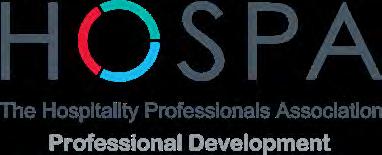
12 minute read
Onwards to reopening
by HOSPA
Full steam ahead to reopening
With England now given its reopening date, the United Kingdom is able to work towards a return for the hospitality sector, writes Katherine Doggrell
Advertisement
The announcement was welcomed by Jane Pendlebury, HOSPA Chief Executive, who said: “Having a definite opening date means hospitality can finally see a way forward – with the relaxation of the social distancing rule a huge relief for hoteliers and others in the industry.
“The uninitiated may see a hotel room as sufficiently socially distant (notwithstanding the cleaning logistics), but the situation is far more complicated than this. Without the ancillary services which people expect, such as the restaurant, bar and spa, hotels are going to struggle to attract custom once the novelty of simply getting away post-lockdown wears off.
“Reducing the social distancing measures then will have a huge impact. To outline the difference it makes, revenue management modelling suggests that 2-metre social distancing, which effectively creates a 4-metre diameter, reduces restaurant revenue to as little as 7% – a nonviable return given the factors involved.
“This changes considerably though as the distance is reduced. The proposed 1-metre distancing, equating to a 2-metre diameter of space, allows for around 45% of revenue. While this is still a huge reduction, if hoteliers and other restaurateurs are creative in their approach, they can work to increase those margins by implementing a variety of measures. This, at least gives them a chance to head in the right direction, enabling the opportunity to develop a workable service.
“Of course, safety is paramount and our priority is opening safely, for both guests and staff, but this offers the industry, if not exactly an open door to a return, then certainly a workable margin. No doubt there’ll be muted celebrations in hotels all around the country as we look to start moving forward again.”
Prime Minister Boris Johnson said that hospitality had a “massive opportunity with all their inventiveness to exploit outdoor space, hitherto unloved space that may become havens and to use their ingenuity to open up in all the ways they can”.
Thomas Dubaere, COO of Accor North Europe, told us: “We wholeheartedly welcome today’s announcement from the government. Our focus throughout this pandemic has been supporting our staff and guests and it is vital that as measures are relaxed, we all continue to play our role in maintaining vigilance.
“To ensure guest safety and provide reassurance, we have introduced an intensified hygiene and prevention programme of measures called AllSafe which is verified in each hotel by external expert auditors. It will clearly take time to return to normal, but each extra step we can take along the way will help the industry rebuild and do what it does best for society and the economy, which is to provide great experiences and help bring people together.”
Carine Bonnejean, Managing Director of Hotels, Christie & Co, added: “It’s great to finally get some certainty around when hotel businesses can resume, this news will have come as a massive relief for the hotel industry, I’m sure.
“This is the best news that could have happened for businesses that rely heavily on trade over the summer period and will have a catalytic effect on everything, as businesses can start to plan properly.
“It will be interesting to see how things reopen, but it will take time for the market to properly recover. The next few months are not going to be easy, it’s going to be a rollercoaster. But now, at least, we are on the rollercoaster and we’re moving.”
Julian Troup, Head of Hotels Agency at Colliers International, said: “Since the announcement in mid-May that the government had confirmed an “ambition” to open some hospitality businesses, from 4 July, as agents, we experienced a material pick up in the volume of activity that we were seeing, and generally, there has been a good deal more viewing requests and offers made on hotels in recent weeks.
“In addition, our clients’ feedback has been particularly upbeat in relation to hotel bookings coming in and general customer demand across the sector. Although July may prove to be a month of contemplation, already August and September “staycation” bookings appear to be coming through at a healthy rate. The critical impact for the sector will be the reduced capacity while ensuring that guests and employees are kept healthy, safe and secure.”
UKHospitality CEO Kate Nicholls said: “The government has given due recognition to how hard hospitality has been hit by this crisis. Our sector was one of the first to be seriously affected and we are going to be one of the last to reopen. Getting venues open again, even with social distancing measures in place, is the best way to secures businesses and jobs.
“We know that many people will be keen to get out and support their local pubs, restaurants and coffee shops, and to return to leisure and holiday pursuits.
“While many venues will endeavour to reopen on 4th July, capacities will be constrained by social distancing and some may be unable to trade viably at all, so continued government support will remain crucial. Many businesses have been closed for months with no revenue and are now facing substantial rent and PAYE bills. We
need financial help from the government, otherwise some of these businesses are going to go under right at the point at which they are allowed to open once again.”
CGA calculated that this means 145 million additional pints of beer will be sold through the sector, compared with what would have been sold with 2 metre social distancing.
CGA’s original forecast was based on 2 metre social distancing remaining in place until the end of August, meaning outlets could only trade at around 30% capacity, whereas at 1 metre they can trade at 70%, equating to a significant difference in sales as a result of increased capacity alone.
“As well as the difference in sales, more outlets are likely to open in July, as their businesses become viable at 70% capacity. The combination of more outlets opening and a significantly higher capacity across all who do, equates to an additional 145 million pints of beer sold over the remainder of 2020, although this does depend on consumer confidence and how people feel about going out again,” commented Jonny Jones, CGA’s director of client services.
“Our data suggests there is enough pent-up demand to max out sales at this level of supply, but many consumers are still cautious about returning to the trade and want to see precautions put in place to ensure their safety. It’s now down to operators to market their credentials as Covid-19 safe, and ensure that customers feel comfortable to visit their outlets.”
The BBPA welcomed the news saying that 75% of UK pubs should now be able to reopen. The BBPA, suggested that GDPR legislation could get in the way if pubs are asked to collect contact details from customers. CEO Emma McClarkin said: “This is an important step for us but it is just the first step on what will be a very a long road to recovery for our sector.”
A consumer insight report to assess the impact of COVID-19 on consumer habits revealed that diners and drinkers may be slow to return to the hospitality sector as customer confidence takes a hit.
The Safe to Trade consumer insight report, designed to track customer sentiment around returning to food and drink establishments said that half of consumers weren’t confident that the government guidelines would go far enough, with 96% of customers wanting to see venues rated in terms of their COVID compliance.
Nine out of 10 respondents would choose one venue over another if it clearly showed it conformed to, or surpassed, government safety standards; 94% of consumers would like to see industry experts advising on venue safety practices and 89% of guests would like to see outlets going above beyond any government advice, to provide maximum protection.
Mark Flanagan, CEO at Shield Safety Group, which administrated the Safe to Trade Scheme, and who headed up the Scheme’s Governance Board, said: “The hospitality industry has been significantly impacted by the COVID-19 pandemic. Over the next six to 12 months businesses in the sector are going to have to re-think how they engage with and reassure their loyal customers if they are to quickly start to regain lost revenue, as well as reassure both colleagues and customers.
“It’s clear from the Safe to Trade insight report that consumers don’t trust the government to go far enough to ensure their safety. If consumer confidence is to be supercharged and customers are to come back through the doors in serious numbers, then the industry is going to have to grab the bull by the horns and demonstrate that restaurants, pubs, bars and hotels are COVID-safe spaces. Consumers are demanding more and the hospitality businesses that will win, in the ‘new normal’, will be the ones that listen, respond and make the customer feel safe.”
Hotel guidance
Fuller considerations for hotel operators are set out by UKHospitality, but particular consideration should be given to: • Taking measures to make reception areas safer, with increased cleaning, keeping the activity time as short as possible and considering the addition of screens between guests and staff. • Considering minimising lift usage fr om reception, and providing clear signage for new lift rules • Where offering room service, taking measures such as dropping butler’s trays outside door, and encouraging tips to be added to the bill • Ensuring that housekeeping staff follo w government handwashing guidelines, and making a checklist of all hand contact services to be cleaned when each guests vacates. • Enc ouraging guests to wear masks on communal corridors Checking the latest go vernment guidance on opening of additional guest facilities (e.g. swimming pools, saunas). Ensuring that any bar or dining area is only opened in a way compliant with UK government guidance on the hospitality sector.
Restaurants, pubs, bars and takeaway guidance
Calculating the maximum number of customers that can reasonably follow social distancing guidelines (2 metres, or 1 metre with risk mitigation where 2 metres is not viable, is acceptable) at the venue. Taking into account total indoor and outdoor space, specific venue characteristics such as furniture as well as likely pinch points and busy areas. Rec onfiguring indoor and outdoor seating and tables to maintain social distancing guidelines (2 metres, or 1 metre with risk mitigation where 2 metres is not viable, is acceptable) between customers of different households or support bubbles. For example, increasing the distance between tables. W orking with your local authority or landlord to take into account the impact of your processes, including queues, on public spaces such as high streets and public car parks. W orking with neighbouring businesses and local authorities to provide additional parking or facilities such as bike-racks, where possible, to help customers avoid using public transport. Reducing the need for customers to queue, but where this is unavoidable, discouraging customers from queuing indoors and using outside spaces for queueing where available and safe. For example, using some car parks and existing outdoor services areas. Managing outside queues to ensure they do not cause a risk to individuals, other businesses or additional security risks, for example by introducing queuing systems, having staff direct customers and protecting queues from traffic by routing them behind permanent physical structures such as street furniture, bike racks, bollards or putting up barriers. Pr oviding clear guidance on social distancing and hygiene to people on
arrival, for example, signage, visual aids and before arrival, such as by phone, on the website or by email. Managing the entry of customers, and the number of customers at a v enue, so that all indoor customers are seated with appropriate distancing, and those outdoors have appropriately spaced seating or standing room. This is to ensure that the venue, including areas of congestion does not become overcrowded. Managing entry numbers can be done, for example, through reservation systems, social distancing markings, having customers queue at a safe distance for toilets or bringing payment machines to customers, where possible. Making customers aware of, and encouraging compliance with, limits on gatherings. For example, on arrival or at booking. Indoor gatherings are limited to members of any two households (or support bubbles), while outdoor gatherings are limited to members of any two households (or support bubbles), or a group of at most six people from any number of households. Enc ouraging customers to use hand sanitiser or handwashing facilities as they enter the venue. Ensuring any changes to entrances, exits and queue management take into account reasonable adjustments for those who need them, including disabled customers. For example, maintaining pedestrian and parking access for disabled customers. Reminding customers who are accompanied by children that they are responsible for supervising them at all times and should follow social distancing guidelines. Keeping indoor and soft play areas closed. For guidance on opening outdoor playgrounds safely, see guidance for managing playgrounds published by the Ministry of Housing, Communities and Local Government. Looking at ho w people move through the venue and how you could adjust this to reduce congestion and contact between customers, for example, queue management or one-way flow, where possible. Planning for maintaining social distancing guidelines (2 metres, or 1 metre with risk mitigation where 2 metres is not viable, is acceptable) in the event of adverse weather conditions, being clear that customers cannot seek shelter indoors unless social distancing can be maintained. Working with neighbouring businesses and local authorities to consider how to spread the number of people arriving throughout the day for example by staggering opening hours; this will help reduce demand on public transport at key times and avoid overcrowding. Determining if schedules for essential services and contractor visits can be revised to reduce interaction and overlap between people, for example, carrying out services at night.
STILL ENROLLING


Study with us on our flexible online programmes in Hospitality Finance

The HOSPA Financial Management and Accounting programme is the only online course of its kind providing finance managers in hotels, restaurants and leisure with an industry specific in-depth programme of study.
The course is focused on the requirements of the sector combining best practice from the Uniform System of Accounts for the Lodging Industry with statutory accounting. Studying with us:
Is very easy - all the materials are online and you receive expert tutor support Develops the skills and knowledge to manage a hospitality finance department Gives exemption from the CIMA Certificate in Business Accounting, Papers 1 & 2 Leads to HOSPA Associate (Cert Finance) membership of HOSPA on completion Is convenient and relevant to your career in hospitality finance Costs just £820 + VAT per stage
All courses are endorsed by the Institute of Hospitality.





